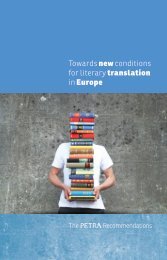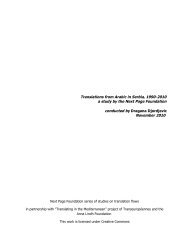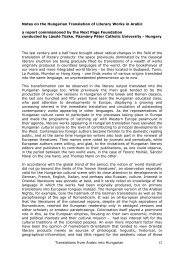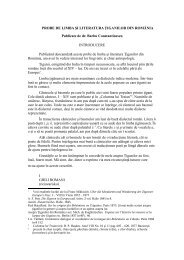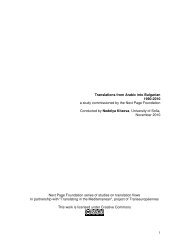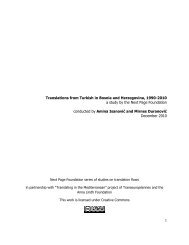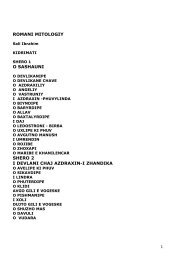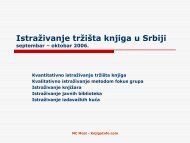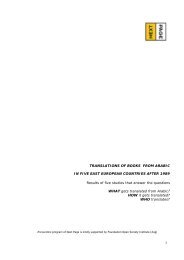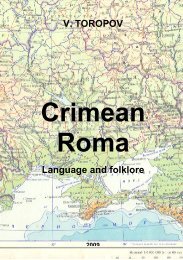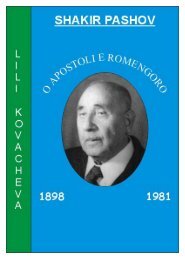the past and the present of book publishing in kurdish language in ...
the past and the present of book publishing in kurdish language in ...
the past and the present of book publishing in kurdish language in ...
Create successful ePaper yourself
Turn your PDF publications into a flip-book with our unique Google optimized e-Paper software.
Publish<strong>in</strong>g <strong>in</strong> Kurdish was <strong>in</strong>terrupted especially after <strong>the</strong> military<strong>in</strong>terventions <strong>of</strong> 1971 <strong>and</strong> 1980. A new constitution was created <strong>in</strong> 1982.Accord<strong>in</strong>g to article 26 <strong>of</strong> this constitution “a <strong>language</strong> banned by law cannotbe used to express <strong>and</strong> spread ideas”. Accord<strong>in</strong>g to article 28 “press is free”but “may not publish anyth<strong>in</strong>g <strong>in</strong> any <strong>language</strong> which is forbidden”. On 19October 1983 a new law # 2932 was <strong>in</strong>troduced to determ<strong>in</strong>e <strong>the</strong> <strong>language</strong>swhich were “forbidden”. Accord<strong>in</strong>g to <strong>the</strong> law, <strong>language</strong>s which “were not <strong>the</strong>first <strong>of</strong>ficial <strong>language</strong>s <strong>of</strong> states recognized by Turkey” were forbidden. Peopleexpress<strong>in</strong>g ideas <strong>in</strong> any <strong>of</strong> <strong>the</strong> forbidden <strong>language</strong>s would be imprisonedbetween 6 months <strong>and</strong> three years. Accord<strong>in</strong>g to article 31 a pr<strong>in</strong>t<strong>in</strong>g housepr<strong>in</strong>t<strong>in</strong>g <strong>book</strong>s <strong>in</strong> forbidden <strong>language</strong>s could be closed (14).The sociologist İsmail Beşikçi is a good example <strong>of</strong> a man who sufferedbecause <strong>of</strong> <strong>the</strong> oppression aga<strong>in</strong>st <strong>the</strong> Kurds. He has stayed <strong>in</strong> prison for 17years <strong>and</strong> 2 months so far because he wrote <strong>book</strong>s about <strong>the</strong> Kurds. He wasalso sentenced to 10 years <strong>of</strong> imprisonment <strong>and</strong> 5 years <strong>of</strong> house arrestbecause <strong>of</strong> a letter he wrote to <strong>the</strong> chairman <strong>of</strong> <strong>the</strong> Swedish Writers' Syndicate<strong>in</strong> 1981. 32 <strong>of</strong> his 36 <strong>book</strong>s published so far have been banned (15). Hispublisher was arrested due to <strong>in</strong>stigation <strong>of</strong> separatism.The law # 2932 bann<strong>in</strong>g <strong>the</strong> Kurdish <strong>language</strong> was revoked on12.04.1991 by <strong>the</strong> law <strong>of</strong> war on terror. However, <strong>the</strong> ban still cont<strong>in</strong>ued. Forexample, <strong>the</strong> 1996 Istanbul edition <strong>of</strong> <strong>the</strong> romantic epos Mem <strong>and</strong> Z<strong>in</strong> written<strong>in</strong> Kurdish <strong>in</strong> 1695 was banned <strong>and</strong> confiscated, <strong>and</strong> as <strong>the</strong> translator М.Em<strong>in</strong> Bozarslan did not live <strong>in</strong> Turkey, <strong>the</strong> publisher İhsan Türkmen wassentenced to 13 months <strong>and</strong> 10 days <strong>of</strong> imprisonment <strong>and</strong> a f<strong>in</strong>e(16).At a time when it was try<strong>in</strong>g to become a member <strong>of</strong> <strong>the</strong> European Union,Turkey found itself <strong>in</strong> a situation where it could not openly defend <strong>the</strong> oldrestrictions on Kurdish. Some secret state documents which were publiclyrevealed (17) show that o<strong>the</strong>r methods were used for imped<strong>in</strong>g <strong>the</strong>development <strong>of</strong> <strong>the</strong> Kurdish <strong>language</strong>. The <strong>of</strong>ficial document # 472 sent to<strong>the</strong> security services by <strong>the</strong> M<strong>in</strong>ister <strong>of</strong> Interior Meral Akşener on 3 January1997 serves as an example <strong>of</strong> <strong>the</strong>se secret documents. It reads:“Tak<strong>in</strong>g adm<strong>in</strong>istrative <strong>and</strong> legal measures aga<strong>in</strong>st those who open research<strong>in</strong>stitutions for spread<strong>in</strong>g <strong>the</strong> Kurdish <strong>language</strong>, for develop<strong>in</strong>g it <strong>in</strong>to a written<strong>and</strong> literary <strong>language</strong>, <strong>and</strong> organiz<strong>in</strong>g Kurdish <strong>language</strong> courses...” (18)In <strong>the</strong> 1990s <strong>in</strong> Nor<strong>the</strong>rn Kurdistan a new development was <strong>the</strong> issue <strong>of</strong>migration. As a response to <strong>the</strong> guerrilla war fought by <strong>the</strong> PKK, <strong>the</strong> Turkishsecurity services set thous<strong>and</strong>s <strong>of</strong> Kurdish villages on fire, depopulat<strong>in</strong>gentire villages. Several million people from <strong>the</strong>se villages had to migrate totowns. Thus <strong>the</strong> security services tried to elim<strong>in</strong>ate <strong>the</strong> guerrilla support <strong>in</strong>villages. Ano<strong>the</strong>r reason for forceful migration was that <strong>the</strong> Kurds settl<strong>in</strong>g8



